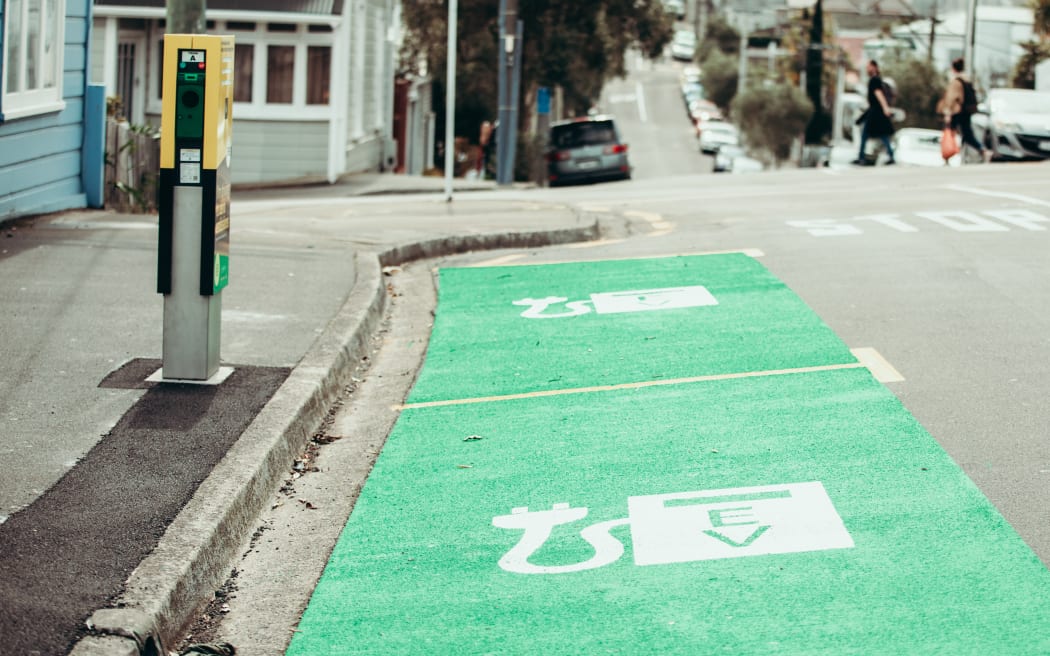This story has been amended to clarify the advice from officials also reflected “high”, “unmonetised” benefits from removing the scheme.

The National Party committed to ending the Clean Car Discount as part of its 100-day plan (file photo). Photo: RNZ /Dom Thomas
The quantified costs of scrapping the Clean Car Discount would be about double the financial benefits of doing so, transport officials calculated.
However, officials also noted there were “high”, “unmonetised” benefits from getting rid of the scheme, which they did not put a number on.
The advice was finalised in November but never officially presented to Cabinet, because the new government suspended the need for regulatory impact statements for undoing Labour-era policies.
Uptake of electric vehicles (EVs) has quadrupled since July 2021, beating the expectations of both the government and the car industry. They are now at 13 percent of the import market. That has pushed the average planet-heating emissions of imported vehicles down by almost a quarter, according to the Ministry of Transport.
The National Party committed to ending the Clean Car Discount as part of its 100-day plan, citing concerns about the cost and what the party sees as unfair impacts, on the basis that wealthier households are more likely to be able to afford EVs.
A rough estimate by officials says scrapping grants for buying EVs (and taxes on some of the highest-emitting vehicles) would cost the country $549 million, while bringing $259 million in quantified benefits over around 30 years, as well as unquantified benefits .
However, officials did not have time to come up with an alternative policy to compare against, which might have kept some of the benefits.
Although the scheme was designed to be self-financing over 10 years, high demand for the subsidies saw it struggle to pay for itself. The analysis notes the scheme would have had to change if it was going to be cost-neutral. However, the change of government saw it scrapped so that work was not done.
The advice was proactively released on the Ministry of Transport's website three days before Christmas.
The projected costs include $93 million lower car maintenance costs, which will be forgone by scrapping the discounts (because EVs need less maintenance), $138 million in fuel savings, plus improvements in air quality that would have saved $224 million on health costs.
On the climate front, if the policy had stayed, the country's vehicles would have pumped out between 1.1 and 2.2 million tonnes less carbon dioxide from now until 2050 - in the same ballpark as what oil company OMV produces in New Zealand in a year, or what NZ Steel emits annually from its Glenbrook steel mill.
The benefits of scrapping the policy include saving the country $177 million in car prices, $37 million lower administration costs for Waka Kotahi and $15 million lower compliance costs for businesses, the analysis says.
The scheme was expected to result in higher uptake of cleaner vehicles and fewer people buying dirtier cars.
Without the Clean Car Discount, the Ministry of Transport told the government it would need to come up with another way to cut emissions from transport from 2026-2030 and 2031-2035, as part of a five-year climate plan the government needs to deliver this year.
The calculations say that, without new policies, a hole will open up in the government's climate goals for transport from 2031, partly because EV uptake would not be high enough to meet the targets. The sector should remain on track, or close to it, until that point.
On the flipside, the advice also noted that EV prices have dropped significantly on their own since the policy was enacted, partly because of cheaper Chinese electric vehicles entering the New Zealand market.
"When the scheme was introduced the cheapest EV available had a retail price of around $65,000. Now a similar new EV can be purchased for around $44,500," says the regulatory impact statement, while noting that this is still around $20,000 more than a comparable new petrol car.
Advice from the ministry also says that changes to the scheme's design were causing spikes and troughs in the car market, as people tried to get ahead of penalties and benefit from maximum subsidies.

Transport Minister Simeon Brown. Photo: RNZ / Samuel Rillstone
RNZ has approached Transport Minister Simeon Brown for comment.
Previously, Brown has stressed that EVs remain cheaper than fossil fuelled cars over the lifetimes even without subsidies, once the cost of fuel is added for a petrol car.
As well as scrapping the discounts, the government announced on Tuesday that EVs and plug-in hybrid vehicles will no longer be exempt from road-user charges as of 1 April.
Owners of light EVs will pay $76 per 1000 kilometres, to match equivalent diesel-powered vehicles. Meanwhile, plug-in hybrid owners will pay a reduced rate of $53 per 1000km, recognising that they also pay excise duty on their petrol.
EV owners and energy experts ran the sums on the tax costs for various vehicles, and concluded owners of the most-efficient petrol cars would be around twice as well off as owners of some similar-sized full EVs because petrol cars pay per litre of fuel and not per kilometre.
Owners of plug-in hybrids or PHEVs stand to be particularly disadvantaged if they rely on the petrol engines in their cars over long distances, because they will pay per litre as well as per kilometre.
The minister has said that petrol cars will be moved to the same regime as EVs, but has not answered when.

